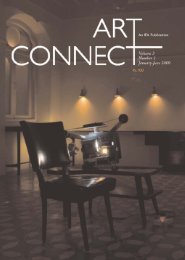Annual Report 2005-2006 - India Foundation for the Arts
Annual Report 2005-2006 - India Foundation for the Arts
Annual Report 2005-2006 - India Foundation for the Arts
You also want an ePaper? Increase the reach of your titles
YUMPU automatically turns print PDFs into web optimized ePapers that Google loves.
ARTS RESEARCH ANDDOCUMENTATION8For <strong>the</strong> first time, IFA made as many as four grantsthat support research towards novels on subjects such as<strong>the</strong> urbanisation of a refugee colony in post-partitionKolkata, <strong>the</strong> cultural history of <strong>the</strong> town of Tiruchenkodein Tamil Nadu, and <strong>the</strong> rise and fall of Carnatic music asa dynamic social <strong>for</strong>m. While research towards fictionalwork has always been within <strong>the</strong> scope of this programme,it is only <strong>the</strong>se recent projects that have beenable to combine an excitement about fiction writing with<strong>the</strong> urge to address serious research questions.Meanwhile, filmmaking on <strong>the</strong> arts continued toattract a substantial number of grants. The five films wehave supported this year cover subjects like family photoalbums,<strong>the</strong> sacred Buddhist dance <strong>the</strong>atre of Chham inSikkim, and <strong>the</strong> lifestyles and dramatic practices of a 120-year old travelling <strong>the</strong>atre company from Andhra Pradesh.Support was also extended to projects that are significantas basic documentation but are also expectedto fur<strong>the</strong>r research and practice. One grant <strong>for</strong> updatingand digitising an existing database on per<strong>for</strong>mancespaces in Karnataka will facilitate tours by <strong>the</strong>atregroups, while ano<strong>the</strong>r grant <strong>for</strong> photographing andannotating an important collection of 5,500 <strong>India</strong>nminiature paintings in a museum is expected triggernew art historical research.In <strong>the</strong> last decade, <strong>the</strong> programme has supportedover 90 projects. This represents a rich and varied corpusof work and IFA remains committed to funding researchand documentation in substantial and enlightened ways.However, arts practice and research have changed considerablyin <strong>the</strong> last ten years and we feel that <strong>the</strong> timeis right <strong>for</strong> a review of <strong>the</strong> programme. The review willrevisit <strong>the</strong> programme’s history, assess its impact andenvisage its future.This programme was started in 1995 in response toa perceived lack of support <strong>for</strong> serious arts scholarship,documentation and archival initiatives. Given <strong>the</strong> dearthof institutional spaces <strong>for</strong> research and documentation in<strong>the</strong> arts, one of <strong>the</strong> key decisions in <strong>the</strong> early years was tosupport individuals––not just scholars but also arts practitioners––soas to trigger critical reflection in relation toarts practice, while allowing <strong>for</strong> <strong>the</strong> insertion of <strong>the</strong> personaland <strong>the</strong> subjective in <strong>the</strong> domain of research. Inaddition, we have funded documentation that hasaddressed livelihood issues, triggered advocacy andaction in <strong>the</strong> field of heritage conservation, and createdinvaluable reference points <strong>for</strong> scholarship.One of <strong>the</strong> key questions to be addressed by <strong>the</strong>review, <strong>the</strong>re<strong>for</strong>e, would be whe<strong>the</strong>r we should continueto remain open to various kinds of research or sharpenour focus <strong>for</strong> greater impact. The review will also determinewhe<strong>the</strong>r our current emphasis on supporting individualsshould be retained or sacrificed in favour of energisinginstitutional spaces <strong>for</strong> arts research. If we continueto place value on <strong>the</strong> individual researcher, however, itwould be important to envisage ways of connecting andconsolidating <strong>the</strong>se discrete endeavours to create avibrant environment <strong>for</strong> enquiry and reflection.GRANTSNivedita Rao, MumbaiRs 3,01,500 over three yearsFor research into <strong>the</strong> Bharuds––allegorical versesfrom <strong>the</strong> middle of <strong>the</strong> fifteenth century attributed toSant Eknath. Compiled by <strong>the</strong> followers of <strong>the</strong> Bhaktisaint, Bharuds exist in Maharashtra as written texts, apartfrom being recited as poems, sung as bhajans and kirtans,and dramatised during <strong>the</strong> pilgrimage of vari and o<strong>the</strong>rreligious occasions. Combining ethnographic study of<strong>the</strong> vari with <strong>the</strong> social histories of <strong>the</strong> per<strong>for</strong>mers, <strong>the</strong>research will engage with <strong>the</strong> making of this marginalisedcultural tradition and examine <strong>the</strong> differences between itsoral, written and per<strong>for</strong>mative <strong>for</strong>ms.Perumal Murugan, Namakkal, Tamil NaduRs 3,28,500 over two yearsFor research towards <strong>the</strong> writing of a novelised historyof Tiruchenkode in Namakkal district, Tamil Nadu. Atown with an ancient history, Tiruchenkode is todaymarked by its hill temple dedicated to Murugan and










